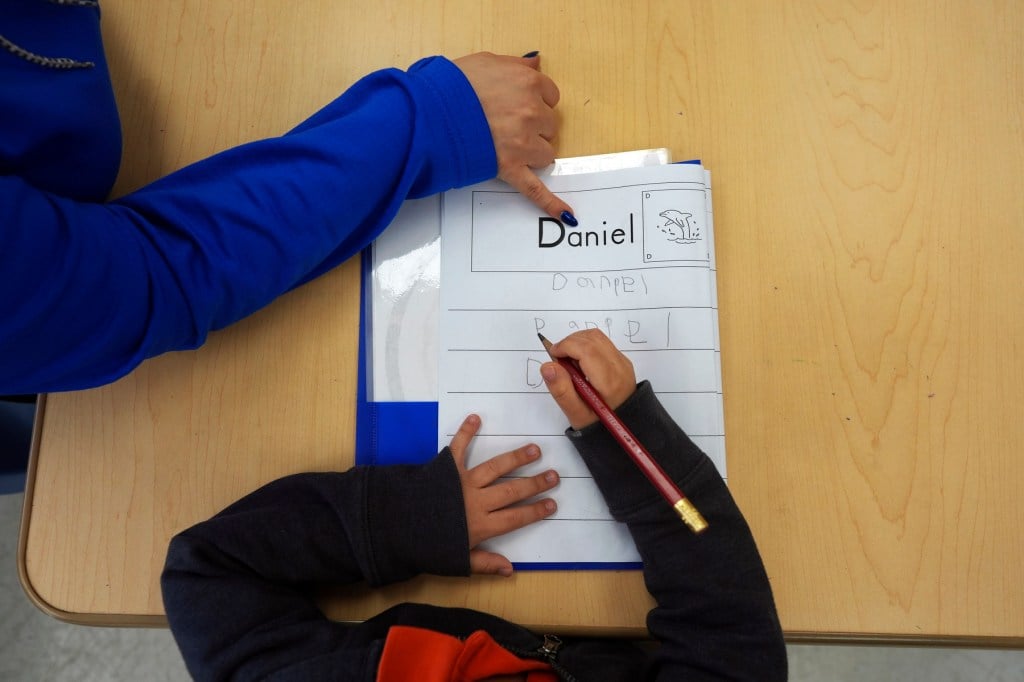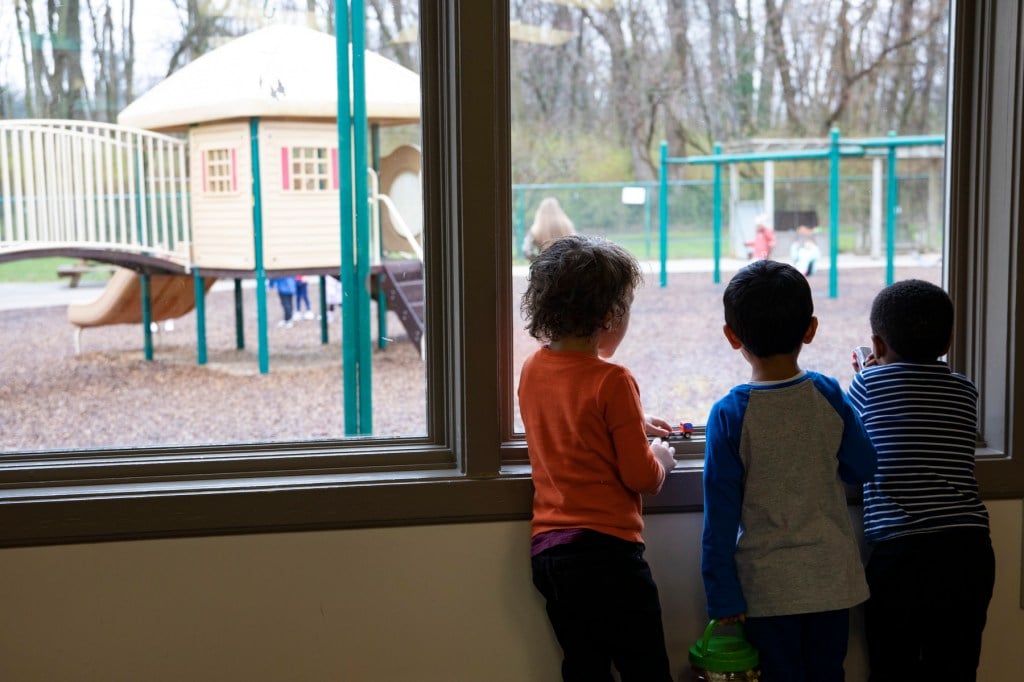For 60 years, Head Start has provided child care for the most vulnerable children in the United States with little controversy.
It was established by a Democratic president, Lyndon B. Johnson, in 1965, and supported by a slew of Republicans since, including Richard Nixon, who called it “valuable”; Ronald Reagan, who established Head Start Awareness Month in the 1980s; and George H. W. Bush, who increased its funding. Legislators from both parties have supported Head Start, which operates in all 50 states, and is the only child care option available in some rural parts of the country.
This year, though, politics came to the door of Head Start. Caught in the political crosshairs of the Trump administration, the program is facing unprecedented upheaval that could shutter child care centers and, as many of Head Start experts who spoke to The 19th see it, fundamentally alter the program.
“For me and for a lot of other directors, trust has been deeply broken,” said Jen Bailey, executive director of Reach Dane, which operates 17 child care centers in Wisconsin and offers Head Start services. “The mission is we serve the neediest of the needy and poorest of the poor. For us, changing that would violate the mission of Head Start.”
The program, which now serves about 700,000 children, was created to support low-income families. It provides free child care to children ages 3 to 5 (Early Head Start serves those under 3) and offers a wide array of services for the entire family, including prenatal support, health screenings and connecting parents to job training, housing and food assistance.
But the Trump administration has dealt several financial blows to the program this year. At one point, it looked like Head Start may be eliminated completely.
And more recently, the future of Head Start has been thrown into uncertainty by an unprecedented directive from the administration: Programs are to ban undocumented children from Head Start entirely.
Attorneys general in 21 Democratic-led states have sued the federal government over this rule, and the Department of Health and Human Services (HHS) has agreed to halt enforcement in those states until September 11. As programs wait for additional guidance on whether they will have to implement that change, the mood is one of unease, confusion and fear, according to interviews with nearly two dozen Head Start experts across the country, including providers, state association directors and federal workers.
There’s a discomfort over just how much the politics of the moment has reached their programs. They don’t want to say anything that could turn D.C.’s attention on them.
At the same time, they are trying to continue to serve Head Start families, knowing that soon, some of them could be barred from it. Because the work they do is so deeply connected with the populations the Trump administration is targeting, they are now weighing a moral dilemma: If Head Start changed, could they stay?
“We would have staff say, ‘I don’t want to work in a program that has this eligibility criteria.’ And I would understand that,” Bailey said.
Already, her centers are seeing dips in attendance from families who are afraid they will get caught in an Immigration and Customs Enforcement (ICE) raid as they bring their kids in. About 70,000 undocumented people live in Wisconsin, according to the Migration Policy Institute; Reach Dane’s centers serve some 1,000 children.
Bailey told her staff that although the political rhetoric has changed, their core values have not. Reach Dane is not making any changes until more guidance arrives from Washington. But if they were forced to check for immigration status, she’s not sure she could stay.
“If it came to the point where it could not take care of staff and kids and families at some sort of basic level, I wouldn’t be able to ethically sit in that space,” said Bailey, who has worked in Head Start for 25 years.
Project 2025, the 900-page document from the conservative Heritage Foundation that has turned into a policy blueprint for President Donald Trump’s second term, dedicates one paragraph to Head Start. Citing “rampant abuse” of children and “lack of positive outcomes,” advising: Eliminate Head Start.
While there have been documented cases of abuse and neglect at Head Start programs, it still has one of the most rigorous safety standards in American child care (the incidents affected fewer than 1 in 1,000 children, according to the Administration for Children and Families, the division that oversees Head Start), and the issues are not unique to Head Start. Numerous studies have also found positive outcomes both in the short and long term for children enrolled in the program.
In April, a leaked White House budget showed the Trump administration was angling to eliminate Head Start altogether, claiming it used a “radical” curriculum that gave preference to undocumented children and embraced diversity, equity and inclusion. In response, the National Head Start Association sent an open letter to the president signed by 50,000 Head Start parents and alumni.
The letter-writing campaign would grow to number nearly 500,000, and state Head Start associations also mobilized to speak out against the program’s elimination. Ultimately, it worked. Head Start received flat funding from Congress — what amounts to a budget cut when accounting for inflation.

(Rebecca Blackwell/AP Photo)
Still, the programs have taken economic hits — in some cases, ones they could barely recover from. Shortly after Trump took office at the end of January, funding to programs was cut off as part of a government-wide freeze. At least 45 programs serving nearly 20,000 children across 23 states spent days and weeks waiting for money to come down. The true number is likely much higher, experts said.
April Mullins-Datko, the Head Start director at ADVOCAP, a community action agency in Wisconsin that provides Head Start services, said her funding was delayed for more than a month. They used some reserve funds and took out a line credit to stay open.
“We were limping. Robbing Peter and paying Paul,” said Mullins-Datko, a 20-year Head Start veteran who was a Head Start child herself in the 1980s. Her twins also went through the program.
A Government Accountability Office report released in July found that the Trump administration violated federal law when it withheld funds from programs that had already been approved by Congress. Between January 20 and April 15, Head Start grantees received $825 million less in funding when compared to the same period in 2024.
Another headwind arrived in April. Five of the 10 regional offices that support Head Start and other child care programs suddenly closed as part of a reduction of the federal workforce. All were in blue states. Programs in 22 states lost specialists who helped them navigate challenges with funding, who served as the first points of contact if a safety incident occurred. The remaining offices, which were already shortstaffed, took on entire states’ caseloads.
Katie Hamm, who oversaw the Head Start program in her role as the deputy assistant secretary for early childhood development for the Biden administration, called it “a game of whack-a-mole, where you think you solved a new issue and here comes another one.” Hamm left the role in January 2025.
But what has really rattled Head Start is the change on immigration. Since the new guidance on undocumented children was issued in July, programs have been in something of a holding pattern.
Fundamentally, the guidance redefines Head Start and other HHS programs as a “federal public benefit,” or in other words, welfare. Head Start has never been defined as a form of welfare, said Allison Siebeneck, an attorney with the American Civil Liberties Union of Illinois, one of the groups suing the federal government over the changes to Head Start. Welfare reform in the 1990s specifically excluded K-12 and early childhood from the definition of a “federal public benefit,” she said: “They could have included it, and they didn’t.”
Redefining Head Start means only U.S. citizens or “qualified aliens” can access the program, excluding undocumented children but also those who are seeking asylum, those with U visas such as victims of serious crimes, those with temporary protected status and recipients of Deferred Action for Childhood Arrivals.

Support The 19th’s ambitious plans
As part of our three-year strategic plan, we’ll keep showing up in the way you’ve told us you need us to: as your relatable guide to an unequal nation. Your support will help drive our plan forward.
When the Trump administration published its rule change, it argued that undocumented immigrants “should not burden” our benefits system. The change was effective immediately.
The new rules came with no additional information on how programs are to screen families. Programs are still waiting for implementation guidance from the federal Office of Head Start. Thousands of teachers, parents and Head Start alumni, meanwhile, have submitted comments in the federal registrar responding to the change, many of them condemning it.
The rule change does include an exemption for nonprofits that offer Head Start services, which is about 70 percent of all programs, but the administration noted that all programs, regardless of the exemption, are encouraged to “pay heed to the clear expressions of national policy” and screen students for immigration status. Siebeneck called it a “thinly veiled threat.”
“You have one statute that says you’re exempt,” she said, “but when you go to sign for your grant you also have to sign a certification saying you’re in compliance with federal law.”
Program directors, who already saw what it was like to suddenly lose funding earlier in the year, are now afraid to lose their grants altogether if they don’t comply with the requirement. Some may comply before exact guidance is released or regardless of nonprofit status.
In Illinois, Lauri Morrison-Frichtl, executive director of the Illinois Head Start Association, said one Head Start director has decided not to enroll children if they find out the family is undocumented.
“They don’t want to do something that gets them in trouble. Our programs follow the rules,” Morrison-Frichtl said. “They are not rule breakers.”
“It’s an odd moment that what we’ve always been doing has now turned into the politics of the moment,” reflected Mullins-Datko, the Head Start program director in Wisconsin. “We can usually find common ground with our children no matter what our politics are because typically we all want the same things for our children: We want them to thrive, we want them to be healthy, we want them to get a good education — that’s why Head Start has enjoyed bipartisan support throughout its history.”
Many Head Start providers would love to return to a time when Head Start wasn’t political, when their primary concern was how to better serve the families and children in their care with the resources they had. Others feel like the mission of Head Start — to protect those most in need — has moved them to speak up at a time when those communities are being targeted.
“Head Start has been around for 11 administrations and 60 years and have never seen these types of asks of us changing our approach to eligibility and enrollment, despite Congress having a lot of opportunities to do that,” said Tommy Sheridan, the deputy director of the National Head Start Association.
The national group is in touch with members across both sides of the aisle who support Head Start. HHS Secretary Robert F. Kennedy, Jr., Sheridan said, has expressed support for the program, saying in May that he would “be very sad” if programs shut their doors and adding that he “fought very hard to make sure Head Start gets all of its funding next year.” Nevertheless, the changes to Head Start have taken place under Kennedy’s leadership at HHS.
It’s now a matter of, “How do we move Head Start out of the way of politics?” Sheridan said.
In Indiana, Rhett Cecil, the head of the state’s Head Start Association, is also trying to keep the conversation nonpartisan.
“There’s no agenda in Head Start,” he said.“I find it remarkably refreshing in a polarized society.”
Cecil is waiting for guidance on implementing the immigration change from the federal Office of Head Start, but said it’s not something his members have thought through much yet. “Our programs will adhere to the standards of Head Start,” he said. About 100,000 undocumented immigrants live in Indiana, putting it in the middle of the pack among states in terms of population.
“Here’s what’s changed in Indiana,” Cecil said: “Nothing.”
Megan Woller, the executive director of the Idaho Head Start Association, said providers in her state are worried about scaring families away and bringing too much attention to Head Start.
“Idaho is a political climate that is right in line with the Trump administration. My state association colleagues across the country who all live in different political climates are advocating in very vocal ways and are banding together,” Woller said. “My members have not wanted to do that. There is a fear of being too vocal and causing a big stink and putting too much focus on Head Start.”
But in other parts of the country, programs have been moved to speak up. Four Head Start state associations and two parent organizations are named plaintiffs in the ACLU lawsuit against the Trump administration. All are blue or purple states — Washington, Illinois, Pennsylvania, Wisconsin, Oregon and California.
In more conservative states, few programs and Head Start Associations were willing to speak to The 19th about this year’s changes. But for some in red states the immigration directive feels like a step too far.
Julie Stone, who leads the Ohio Head Start Association, said the immigration change represents a fundamental shift for programs.
“We are about meeting families where they are. We are about doing what’s right for children,” Stone said. “We’ve never been required to establish their status, but we know their parents are working and we know we have them in a safe and nourishing environment.”
And ICE enforcement is only ramping up. The agency’s annual budget is set to triple. That makes her anxious, “knowing there will be more enforcement and we are somehow … getting wrapped up in this,” Stone said.

(Maansi Srivastava/The Washington Post/Getty Images)
Multiple programs and state Head Start agencies told The 19th that the political rhetoric around immigration is distorting the reality of who the families who rely on Head Start are, what they contribute to their communities and why the program is needed.
“What I know to be true about Head Start: The majority of [the families] go to work,” said Jennie Mauer, the head of the Wisconsin Head Start Association. Many of those undocumented families in her state work in the dairy industry, which relies on migrant workers to operate. Those workers, an estimated 70 percent of the dairy workforce, need somewhere to put their children.
Otherwise, how will the Dairy State continue to be the Dairy State?
“We can have all that [political] rhetoric, but I want safe communities and I want safe children,” Mauer said. “I do not believe that coming to Head Start and putting these questions to families who are just trying to go to work is the way to do it.”
In Detroit, this year of upheaval has already led to the closure of a Head Start program, leaving 324 children without child care.
The center, called Focus: HOPE, had been receiving Head Start funding as part of a consortium of three programs. Last year, the consortium disbanded and each program applied individually. CEO Portia Roberson said her program tried to put together a grant application that aligned with the priorities of the new administration, noting that it served “all” children.
They were supposed to hear back about their grant in March, but nothing came. Michigan was one of the states that lost its regional office in April, meaning the staff that ensured grants were evenly spaced so communities didn’t lose Head Start services were gone.
By July 31, still not having heard anything, the money ran dry. Focus: HOPE laid off nearly 100 staff members and announced the closure of their Head Start services. Roberson expected parents to be angry with her. But instead, she said, “they were here to figure out how they could support what we are doing and to let people know how important we are for their families.”
In mid-August, the program learned its grant application had been denied. No explanation was given at first — they later learned that one of the providers in the consortium, Starfish Family Services, had received the funding Focus: HOPE expected to go to them.
“The current administration talks about wanting to build a workforce. My question is how do parents become a part of this workforce if there is no safe and educational place to put their children?” she said. Now, “I’m taking people out of the workforce.”
Roberson is hoping Starfish will take them back in as a subgrantee, which will allow her to service the families in their care. If that happens, she will then have to consider what those services would look like with the new immigration changes.
“What gets lost in all of this is we are just trying to help people who need help. We are not making decisions around race or class or political party,” she said. “
She doesn’t know how she could enforce the immigration directive. If it came down to protecting children from being removed, Roberson said, Focus: HOPE would do “whatever needs to be done.”
Great Job Chabeli Carrazana & the Team @ The 19th Source link for sharing this story.




